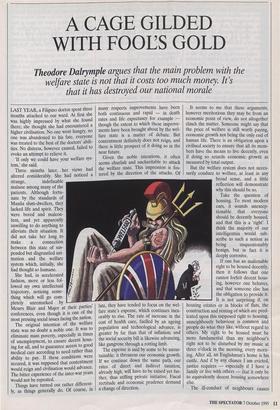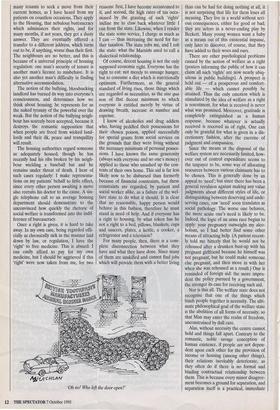A CAGE GILDED WITH FOOLS GOLD
Theodore Dalrymple argues that the main problem with the welfare state is not that it costs too much money. It's that it has destroyed our national morale
LAST YEAR, a Filipino doctor spent three months attached to our ward. At first she was highly impressed by what she found there; she thought she had encountered a higher civilisation. No one went hungry, no one was abandoned to his fate, everyone was treated to the best of the doctors' abili- ties. No distress, however caused, failed to evoke an attempt to relieve it. 'If only we could have your welfare sys- tem,' she said. Three months later, . her views had altered considerably. She had noticed a strange, indefinable malaise among many of the patients. Although fortu- nate by the standards of Manila slum-dwellers, they lacked life and spirit. They were bored and malcon- tent, and yet apparently unwilling to do anything to alleviate their situation. It did not take her long to make a connection between this state of sus- pended but disgruntled ani- mation and the welfare system which, initially, she had thought so humane.
She had, in accelerated fashion, more or less fol- lowed my own intellectual trajectory, noticing some- thing which will go com- pletely unremarked by Messrs Blair and Major at their parties' conferences, even though it is one of the most pressing social issues facing the nation. The original intention of the welfare state was no doubt a noble one. It was to eliminate mass poverty, especially in times of unemployment, to ensure decent hous- ing for all, and to guarantee access to good medical care according to need rather than ability to pay. If these conditions were secured, it was supposed that contentment would reign and civilisation would advance. The bitter experience of the inter-war years would not be repeated. Things have turned out rather different- ly, as things generally do. Of course, in many respects improvements have been both continuous and rapid — in death rates and life expectancy for example — though the extent to which these improve- ments have been brought about by the wel- fare state is a matter of debate. But contentment definitely does not reign, and there is little prospect of it doing so in the near future.
Given the noble intentions, it often seems churlish and uncharitable to attack the welfare state. This impression is fos- tered by the direction of the attacks. Of late, they have tended to focus on the wel- fare state's expense, which continues inex- orably to rise. The rate of increase in the cost of health care, fuelled by an ageing population and technological advance, is greater by far than that of inflation; and the social security bill is likewise advancing, like gangrene through a rotting limb.
The expense is said by some to be unsus- tainable: it threatens our economic growth. If we continue down the same path, our rates of direct and indirect taxation, already high, will have to be raised yet fur- ther, thus stifling private initiative. Fiscal rectitude and economic prudence demand a change of direction. It seems to me that these arguments, however meritorious they may be from an economic point of view, do not altogether clinch the matter. Someone might say that the price of welfare is still worth paying, economic growth not being the only end of human life. There is an obligation upon a civilised society to ensure that all its mem- bers have the means to live decently, even if doing so retards economic growth as measured by total output.
Take the question of housing. To most modern ears, it sounds unexcep- tionable that everyone should be decently housed, and that this is a 'right'. I think the majority of our intelligentsia would sub- scribe to such a notion as being unquestionably benign, but in fact it is deeply corrosive.
If one has an inalienable right to be housed decently, then it follows that one cannot forfeit decent hous- ing, however one behaves, and that someone else has the obligation to provide it. It is not surprising if, on housing estates or in blocks of flats, the construction and renting of which are pred- icated upon this supposed right to housing, unneighbourly behaviour is common and people do what they like, without regard to others. My right to be housed must be more fundamental than my neighbour's right not to be disturbed by my music at three o'clock in the morning, every morn- ing. After all, an Englishman's home is his castle. And if by any chance I am evicted, justice requires — especially if I have a family or live with others — that it only be to equivalently decent housing somewhere else.
The ill-conduct of neighbours causes many tenants to seek a move from their current homes, as I have heard from my patients on countless occasions. They apply to the Housing, that nebulous bureaucracy which administers their rights, and for many months, if not years, they get a dusty answer. They are eventually offered a transfer to a different address, which turns out to be, if anything, worse than their first. The neighbours are no better, and this is because of a universal principle of housing regulation: one man's security of tenure is another man's licence to misbehave. It is also yet another man's difficulty in finding alternative accommodation.
The notion of the bullying, bloodsucking landlord has burned its way into everyone's consciousness, and determines how we think about housing; he represents for us the naked tyranny of the powerful over the weak. But the notion of the bullying neigh- bour has scarcely been accepted, because it destroys the romantic supposition that when people are freed from wicked land- lords and their ilk, peace and tranquillity will result.
The housing authorities regard someone as adequately housed, though he has recently had his ribs broken by his neigh- bour wielding a baseball bat and he remains under threat of death. I hear of such cases regularly: I make representa- tions on my patients' behalf to little effect, since every other person awaiting a move also recruits his doctor to the cause. A sin- gle telephone call to an average housing department should demonstrate to the unconvinced how quickly the rhetoric of social welfare is transformed into the indif- ference of bureaucracy.
Once a right is given, it is hard to take away. In my own case, being regarded offi- cially as chronically sick in the manner laid down by law, or regulation, I have the 'right' to free medicine. This is absurd: I can easily afford to pay for my own medicine, but I should be aggrieved if this 'right' were now taken from me, for two reasons: first, I have become accustomed to it, and second, the high rates of tax occa- sioned by the granting of such 'rights' incline me to claw back whatever little I can from the state. Likewise, when I render the state some service, I charge as much as I can — thus increasing the need for fur- ther taxation. The state robs me, and I rob the state: what the Marxists used to call a dialectical relationship.
Of course, decent housing is not the only supposed economic right. Everyone has the right to eat: not merely to assuage hunger, but to consume a diet which is nutritionally optimum. Furthermore, as the general standard of living rises, those things which are regarded as necessities, as the sine qua non of that decent minimum to which everyone is entitled merely by virtue of drawing breath, increase in number and expense.
I know of alcoholics and drug addicts who, having peddled their possessions for their chosen poison, applied successfully for special grants from social services on the grounds that they were living without the necessary minimum of personal posses- sions. I have known the same generosity (always with everyone and no one's money) applied to those who smashed up the con- tents of their own home. This aid is far less likely now to be disbursed than formerly because of financial constraints, but these constraints are regarded, by patient and social worker alike, as a failure of the wel- fare state to do what it should. It is dear that no reasonable, happy person would behave in this fashion, therefore he must stand in need of help. And if everyone has a right to housing, by what token has he not a right to a bed, pillows, blankets, cups and saucers, plates, a kettle, a cooker, a refrigerator and a television?
For many people, then, there is a com- plete disconnection between what they have and what they have done. Since many of them are unskilled and cannot find jobs which will provide them with a better living 'Oh no! Who left the door open?' than can be had for doing nothing at all, it is not surprising that life for them loses all meaning. They live in a world without seri- ous consequences, either for good or bad; they are actors in a never-ending play by Beckett. Many young women want a baby as a means out of this existential impasse, only later to discover, of course, that they have added to their woes and ours.
There are other psychological problems caused by the notion of welfare as a right (posters informing the public of how it can claim all such 'rights' are now nearly ubiq- uitous in public buildings). A prospect is held out — of a prosperous and comfort- able life — which cannot possibly be attained. Thus the only emotion which is stimulated by the idea of welfare as a right is resentment, for what is received is never what was promised. Moreover, gratitude is completely extinguished as a human response, because whatever is actually received is received as of right. One can only be grateful for what is given in a dis- cretionary fashion, after the exercise of judgment and compassion.
Since the means at the disposal of the welfare system are necessarily limited, how- ever out of control expenditure seems to the taxpayer to be, some way of allocating resources between various claimants has to be chosen. This is generally done by an appeal to 'need'; but since there has been a general revulsion against making any value judgments about different styles of life, or distinguishing between deserving and unde- serving cases, raw 'need' soon translates as social pathology. The worse one behaves, the more acute one's need is likely to be. Indeed, the logic of an arms race begins to apply: your pregnancy outweighs my alco- holism, so I had better find some other means of attracting help. (A patient recent- ly told me bitterly that he would not be rehoused after a drunken bust-up with his pregnant girlfriend because he himself was not pregnant, but he could make someone else pregnant, and then move in with her when she was rehoused as a result.) One is reminded of foreign aid: the more impru- dent the policy pursued by a government, the stronger its case for receiving such aid.
Nor is this all. The welfare state does not recognise that one of the things which binds people together is necessity. The ulti- mate philosophical goal of the welfare state is the abolition of all forms of necessity, so that Man may enter the realm of freedom, unconstrained by dull care.
Alas, without necessity the centre cannot hold and things fall apart. Contrary to the romantic, noble savage conception of human existence, if people are not depen- dent upon each other for the provision of income or housing (among other things), their relations inevitably deteriorate, as they often do if there is no formal and binding contractual relationship between them. This is because every minor disagree- ment becomes a ground for separation, and separation itself is a practical, immediate possibility. Thus a system of a guaranteed income, regardless of conduct, and the pos- sibility of receiving housing as of right, act as a powerful solvent of commitment to another person. It promotes an egoistic solipsism. It is not surprising, then, that in the world of welfare personal relationships become kaleidoscopic in their imperma- nence and changeability.
This is not to say that people should be welded together in indissoluble relation- ships, come what may. Obviously, there has to be a balance between permanence and dissolubility. But the degree to which the fracture and dispersal of the household is itself a cause of poverty and squalor has not been recognised; and for too long the Strindbergian view of family life, as inevitably horrific, has held sway in the imagination of influential intellectuals. The idea has thus been bruited about, and suc- cessfully communicated to the entire popu- lation, that human relationships can be made painless and without conflict, if insti- tutional arrangements are but flexible enough and welfare easily enough avail- able; an idea which is (if I may be allowed to use a slightly odd phrase) deeply shal- low.
There are other things which could be said about the welfare system, about its addictive nature and the thraldom in which it holds people, and about its apparently paradoxical penalisation of those people who attempt to escape its thraldom by, for example, trying to educate themselves. But the question will inevitably arise: can we in practice do anything about the harmful effects of the welfare state?
I am not optimistic. An enormous bureaucracy of care has emerged; and the careers of many politicians depend upon the existence of a substantial population of people who are themselves dependent upon the politicians who maintain the sta- tus quo. Contrary to popular conceptions, it is not only large companies and bloated plutocrats who have vested interests.
It seems to me that the first step is to deny the moral high ground to propo- nents of further welfare, by arguing that there are justifiable grounds for concern other than those dictated by fiscal cheeseparing. For far too long compas- sion has been measured in this country by the level of top-rate income tax one is prepared to advocate, a level of 98 per cent earning one a reputation almost for saintliness.
The British, being unfeeling, are a senti- mental nation: they regard taxation as a kind of forced contribution to the RSPCA, and the poor as birds with broken wings, or puppies which have been maltreated by their owners. But the poor are not pets, and welfare is not a bandage, tender loving care or a good home; it is a cage gilded with fool's gold.
Theodore Daltymple's So Little Done was published last month by Deutsch (£8.99).












































































 Previous page
Previous page